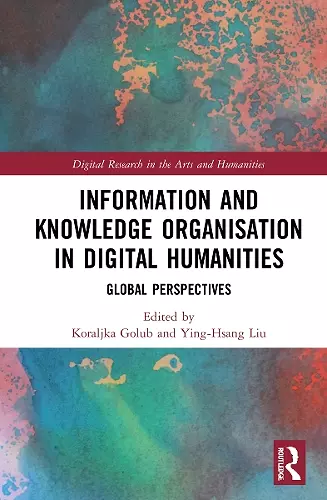Information and Knowledge Organisation in Digital Humanities
Global Perspectives
Koraljka Golub editor Ying-Hsang Liu editor
Format:Hardback
Publisher:Taylor & Francis Ltd
Published:8th Dec '21
Should be back in stock very soon
This hardback is available in another edition too:
- Paperback£39.99(9780367675684)

Information and Knowledge Organisation explores the role of knowledge organisation in the digital humanities. By focusing on how information is described, represented and organised in both research and practice, this work furthers the transdisciplinary nature of digital humanities.
Including contributions from Asia, Australia, Europe, North America and the Middle East, the volume explores the potential uses of, and challenges involved in, applying the organisation of information and knowledge in the various areas of Digital Humanities. With a particular focus on the digital worlds of cultural heritage collections, the book also includes chapters that focus on machine learning, knowledge graphs, text analysis, text annotations and network analysis. Other topics covered include: semantic technologies, conceptual schemas and data augmentation, digital scholarly editing, metadata creation, browsing, visualisation and relevance ranking. Most importantly, perhaps, the book provides a starting point for discussions about the impact of information and knowledge organisation and related tools on the methodologies used in the Digital Humanities field.
Information and Knowledge Organisation is intended for use by researchers, students and professionals interested in the role information and knowledge organisation plays in the Digital Humanities. It will be essential reading for those working in library and information science, computer science and across the humanities.
The Open Access version of this book, available at www.taylorfrancis.com, has been made available under a Creative Commons Attribution-Non Commercial-No Derivatives 4.0 license.
“This book represents a high-level work aimed at researchers and academics in the areas of digital humanities, cultural heritage informatics and information science, as well as professionals in libraries, archives and museums (LAMs), with a focus on the fundamental theories, models and best practices in knowledge organisation. It contains research articles and experiments by authors who have been recognized as experts in the field and are at the forefront of national and international collaborations. Each of the chapters constitutes a unique and innovative contribution. Put together, this monograph represents one of the most important areas of research in this field in the 2020s.” -- Marcia Lei Zeng, Kent State University, USA.
"Over the last two decades, the Digital Humanities has passed its emerging and evolving stages and now rapidly approaches a more advanced and sophisticated realm of its development as a mature and multidisciplinary area of research and practice. At the same time, scholars and practitioners in this new territory need a range of well-established theories, tools and techniques to collect, organise, share, and generate information and knowledge related to their activities and achievements. This book is a timely response to this urgent need at various levels. It provides an informative and insightful vision towards the applicability and transferability of information and knowledge organisation scholarship for the progress of Digital Humanities. Information professionals, students, and scholars across the GLAM sector (Galleries, Libraries, Archives and Museums) will find the book informative and enlightening. Furthermore, it shows how they can collaborate with scholars and practitioners in the Digital Humanities projects and contribute to the further advancement of this area." -- Yazdan Mansourian, School of Information and Communication Studies, Charles Sturt University, Australia.
"This is the first book that addresses the role of information and knowledge organization (IKO) in digital humanities (DH). The book chapters provide snapshots of how information can be organized in various contexts in digital humanities. Organizing cultural heritage collections in digital environments is addressed in topics such as the creation and adoption of conceptual models and metadata standards, the incorporation of linked open data, approaches to enriching metadata, and the aggregation and interoperability of metadata across cultural heritage collections. Several chapters were devoted to managing digital humanities resources for preservation and reuse, and examples of semi-automated and automated approaches to supporting knowledge organization for improved access, discovery and navigation of digital humanities materials. These diverse topics are discussed from the international perspectives. The book may inspire the researchers of the two fields (IKO and DH) to study knowledge organization methods for processing digital humanities materials and humanities-driven knowledge organization approaches, and may also encourage the collaboration of the researchers in the two fields. The book may also be useful to information professionals in managing digital humanities resources." ~ Yejun Wu, Associate Professor, School of Library and Information Science, Louisiana State University, USA.
”This volume comes as an extremely timely contribution to bridge the gap between knowledge organisation and digital humanities fields. Their points of convergence are very apparent but still - especially considering that information studies, the home discipline of knowledge organisation, has been increasingly active in digital humanities community - there has been little comprehensive work to bring the two together in dialogue. Golub and Liu's volume takes an important step to this direction by lining up a highly international and diverse collection of chapters shedding light to major contexts where knowledge organisation plays a crucial role in and for digital humanities research and vice versa.” ~ Professor Isto Huvila, Department of ALM, Uppsala University, Sweden.
ISBN: 9780367675516
Dimensions: unknown
Weight: 607g
290 pages